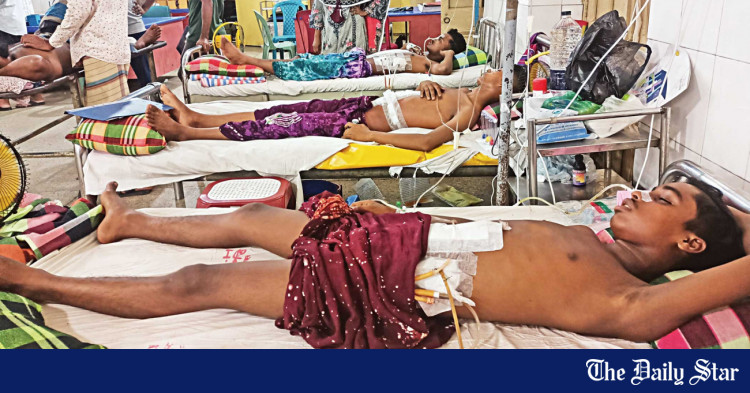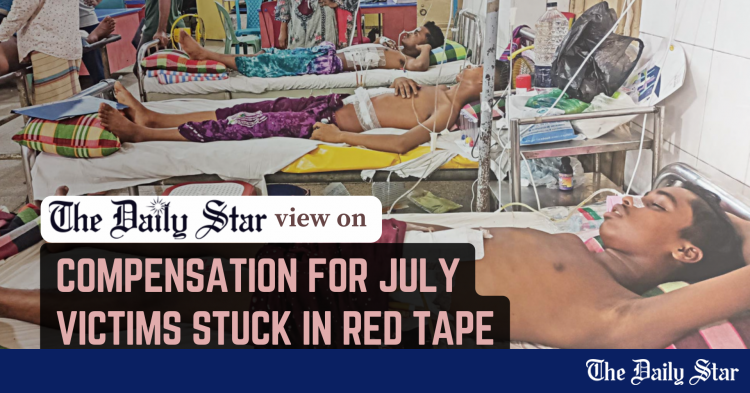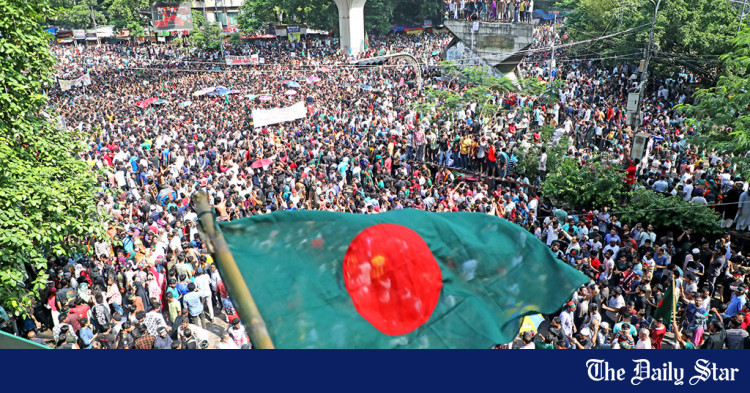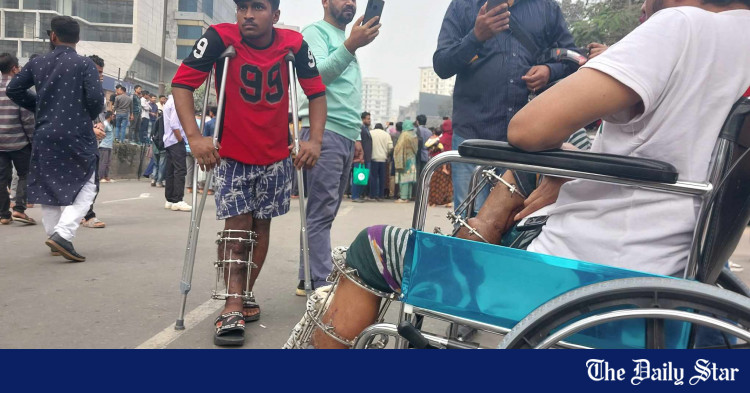Saif
Senior Member
- Joined
- Jan 24, 2024
- Messages
- 17,281
- Likes
- 8,334
- Nation

- Residence

- Axis Group


Injured to go abroad for treatment, foreign specialists to come too
The health ministry has sent 30 persons who were injured in the July uprising, for better treatment overseas. Two of them have returned home after completion of their treatment. The ministry will be sending another 12 overseas soon, for advanced medical treatment.
Injured to go abroad for treatment, foreign specialists to come too
Shishir Moral
Dhaka
Updated: 01 Feb 2025, 22: 55

A youth wounded in the July mass uprising being taken to hospital. Picture taken at 3:00 in the afternoon on 4 August 2024 at the New Market intersection in Chattogram cityProthom Alo file photo
The health ministry has sent 30 persons who were injured in the July uprising, for better treatment overseas. Two of them have returned home after completion of their treatment. The ministry will be sending another 12 overseas soon, for advanced medical treatment.
Sources in the health ministry say, alongside sending the injured abroad, efforts are also being made to bring in foreign specialists to provide medical treatment to the injured within the country. A 10-member team of physicians arrived in Bangladesh on 27 January from the US. On 4 February, 5 eye specialists are scheduled to arrive from Singapore. Over the past few months several physicians had visited Bangladesh from Thailand, China, the UK and France to treat the injured persons here.
Till 27 January, the ministry has spent around Tk 161.47 million (Tk 16 crore 14 lakh 72 thousand) on overseas treatment. Of this, over Tk 63.70 million (Tk 6 crore 37 lakh) was spent on one person alone. Officials of the ministry say that it will take another few months for that injured person's treatment to be completed at Singapore National Hospital.
Speaking to Prothom Alo, health advisor Nur Jahan Begum said, "We are continuing our efforts to ensure that the injured get the best medical treatment. If the required treatment is not possible in the country, we will certainly send them abroad. And if necessary, we will bring specialists from abroad too."
It has not been possible to determine the exact number of persons injured in the July-August uprising. However, a list of 11,551 persons, whose names and details could be ascertained, has been published on the health directorate's website. The government says this is a draft list. Those on the list will receive necessary treatment free of cost.
The health advisor said, it has not been possible to provide treatment to many of those injured from 15 to 20-21 July, before the fall of the government. Many had been too scared to get admitted to hospital at that time and many had fled from hospital before their treatment was completed. There are also allegations that many were made to leave the hospitals.
Actual treatment was provided only after the government was toppled, from mid-August. But in the meantime, many have already undergone much harm. According to latest reports, there are still around 130 injured persons undergoing treatment at the National Institute of Traumatology and Orthopaedic Rehabilitation (NITOR - and better known as Pangu Hospital), BSMMU, the National Institute of Ophthalmology & Hospital and the Combined Military Hospital (CMH).
20 under treatment in Thailand
The health ministry's list indicates that 30 of the injured persons have been sent to four hospitals in Thailand and three in Singapore. Of them, 20 have been sent to Thailand, 10 to Singapore.
Nine of those sent to Singapore received pellet injuries in their eyes. One of them who received a bullet in his head, is suffering from brain haemorrhage. Of those sent to Thailand, some have been injured in the eyes, in the head, some have nerve and spinal injuries. Two have returned after completing treatment in Thailand.
Sajjad Hossain, a student of Pabna Textile Engineering College, was hit in the eye by a shotgun bullet on 4 August. He was first treated at Pabna and then at four hospitals in Dhaka. In the second week of December, the health ministry sent him to Bumrungrad Hospital in Thailand. Sajjad returned home on 26 December after completion of his treatment. Speaking to Prothom Alo on Friday, he told Prothom Alo, "I have not regained sight in my left eye. Had I been sent for treatment earlier, I would have regained 50 to 60 per cent sight."
Seven-year-old Basit Khan Musa was shot in the head on 19 July in front of his home. On 22 October he was sent to Singapore National University Hospital. His father Mustafizur Rahman told Prothom Alo that his condition has improved after a few surgeries. He can now move his arm and leg on one side of his body.
China has committed to providing robotic physiotherapy to those injured during the mass uprising. The equipment for this purpose costs around Tk 120 million to Tk 130 million
Khokan to go to Russia
Khokan Chandra Barman's face is unrecognisable after being hit by a bullet. He has been under treatment at the National Burn Institute for about six months. His cheek and nose had been torn apart.
Khokan will receive treatment at the Moscow State University Clinic in Russia. The ministry officials hope that the physicians there will do all they can to restore Khokan's face to as it was before. They will first replace his cheek and then his nose. After that, various tissues of his face will be fixed. Khokan is to leave for Russia in the first week of February. Treatment will begin in the last week of March.
Advanced physiotherapy
Ministry officials say, China has committed to providing robotic physiotherapy to those injured during the mass uprising. The equipment for this purpose costs around Tk 120 million to Tk 130 million (Tk 12 to 13 crore). This robotic physiotherapy equipment, provided as a gift, will be set up Shaheed Abu Sayeed Convention Building at Bangabandhu Sheikh Mujib Medical University (BSMMU). Those injured in the mass uprising will be given priority to avail this service.
The ministry will procure two more robotic physiotherapy machines with their own funds from China. The officials say one will be set up in Chattogram and the other in Rangpur.
Mir Mahbubur Rahman Snigdha, CEO of the July Shaheed Smriti Foundation which was set up to assist the families of the July uprising martyrs and the injured, told Prothom Alo, the injured have been sent overseas on the basis of recommendations of the medical board. The government is bearing the expenses for this. July Shaheed Smriti Foundation is providing assistance with information concerning treatment abroad. Relatives of the injured are also going abroad and are applying for financial assistance in this regard. The foundation is providing financial assistance to such families.
Shishir Moral
Dhaka
Updated: 01 Feb 2025, 22: 55
A youth wounded in the July mass uprising being taken to hospital. Picture taken at 3:00 in the afternoon on 4 August 2024 at the New Market intersection in Chattogram cityProthom Alo file photo
The health ministry has sent 30 persons who were injured in the July uprising, for better treatment overseas. Two of them have returned home after completion of their treatment. The ministry will be sending another 12 overseas soon, for advanced medical treatment.
Sources in the health ministry say, alongside sending the injured abroad, efforts are also being made to bring in foreign specialists to provide medical treatment to the injured within the country. A 10-member team of physicians arrived in Bangladesh on 27 January from the US. On 4 February, 5 eye specialists are scheduled to arrive from Singapore. Over the past few months several physicians had visited Bangladesh from Thailand, China, the UK and France to treat the injured persons here.
Till 27 January, the ministry has spent around Tk 161.47 million (Tk 16 crore 14 lakh 72 thousand) on overseas treatment. Of this, over Tk 63.70 million (Tk 6 crore 37 lakh) was spent on one person alone. Officials of the ministry say that it will take another few months for that injured person's treatment to be completed at Singapore National Hospital.
Speaking to Prothom Alo, health advisor Nur Jahan Begum said, "We are continuing our efforts to ensure that the injured get the best medical treatment. If the required treatment is not possible in the country, we will certainly send them abroad. And if necessary, we will bring specialists from abroad too."
It has not been possible to determine the exact number of persons injured in the July-August uprising. However, a list of 11,551 persons, whose names and details could be ascertained, has been published on the health directorate's website. The government says this is a draft list. Those on the list will receive necessary treatment free of cost.
The health advisor said, it has not been possible to provide treatment to many of those injured from 15 to 20-21 July, before the fall of the government. Many had been too scared to get admitted to hospital at that time and many had fled from hospital before their treatment was completed. There are also allegations that many were made to leave the hospitals.
Actual treatment was provided only after the government was toppled, from mid-August. But in the meantime, many have already undergone much harm. According to latest reports, there are still around 130 injured persons undergoing treatment at the National Institute of Traumatology and Orthopaedic Rehabilitation (NITOR - and better known as Pangu Hospital), BSMMU, the National Institute of Ophthalmology & Hospital and the Combined Military Hospital (CMH).
20 under treatment in Thailand
The health ministry's list indicates that 30 of the injured persons have been sent to four hospitals in Thailand and three in Singapore. Of them, 20 have been sent to Thailand, 10 to Singapore.
Nine of those sent to Singapore received pellet injuries in their eyes. One of them who received a bullet in his head, is suffering from brain haemorrhage. Of those sent to Thailand, some have been injured in the eyes, in the head, some have nerve and spinal injuries. Two have returned after completing treatment in Thailand.
Sajjad Hossain, a student of Pabna Textile Engineering College, was hit in the eye by a shotgun bullet on 4 August. He was first treated at Pabna and then at four hospitals in Dhaka. In the second week of December, the health ministry sent him to Bumrungrad Hospital in Thailand. Sajjad returned home on 26 December after completion of his treatment. Speaking to Prothom Alo on Friday, he told Prothom Alo, "I have not regained sight in my left eye. Had I been sent for treatment earlier, I would have regained 50 to 60 per cent sight."
Seven-year-old Basit Khan Musa was shot in the head on 19 July in front of his home. On 22 October he was sent to Singapore National University Hospital. His father Mustafizur Rahman told Prothom Alo that his condition has improved after a few surgeries. He can now move his arm and leg on one side of his body.
China has committed to providing robotic physiotherapy to those injured during the mass uprising. The equipment for this purpose costs around Tk 120 million to Tk 130 million
Khokan to go to Russia
Khokan Chandra Barman's face is unrecognisable after being hit by a bullet. He has been under treatment at the National Burn Institute for about six months. His cheek and nose had been torn apart.
Khokan will receive treatment at the Moscow State University Clinic in Russia. The ministry officials hope that the physicians there will do all they can to restore Khokan's face to as it was before. They will first replace his cheek and then his nose. After that, various tissues of his face will be fixed. Khokan is to leave for Russia in the first week of February. Treatment will begin in the last week of March.
Advanced physiotherapy
Ministry officials say, China has committed to providing robotic physiotherapy to those injured during the mass uprising. The equipment for this purpose costs around Tk 120 million to Tk 130 million (Tk 12 to 13 crore). This robotic physiotherapy equipment, provided as a gift, will be set up Shaheed Abu Sayeed Convention Building at Bangabandhu Sheikh Mujib Medical University (BSMMU). Those injured in the mass uprising will be given priority to avail this service.
The ministry will procure two more robotic physiotherapy machines with their own funds from China. The officials say one will be set up in Chattogram and the other in Rangpur.
Mir Mahbubur Rahman Snigdha, CEO of the July Shaheed Smriti Foundation which was set up to assist the families of the July uprising martyrs and the injured, told Prothom Alo, the injured have been sent overseas on the basis of recommendations of the medical board. The government is bearing the expenses for this. July Shaheed Smriti Foundation is providing assistance with information concerning treatment abroad. Relatives of the injured are also going abroad and are applying for financial assistance in this regard. The foundation is providing financial assistance to such families.









































